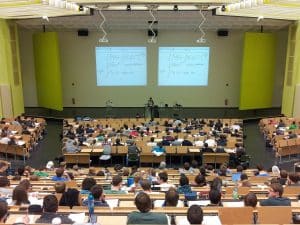Collaboration Opportunity: Exploring Connections between Self-Direction and Student Success in Postsecondary CBE Programs
CompetencyWorks Blog
 AIR has announced a research opportunity on examining connections between student self-direction and their subsequent progression through and completion of their CBE programs in higher education. They seek to understand the relationship between students’ self-direction – anecdotally acknowledged as important, but not yet studied – and their subsequent progression and completion. If you are interested in participating in this study or just want to learn more about it, please provide your contact information at: https://www.surveymonkey.com/r/CBESelfDirection.
AIR has announced a research opportunity on examining connections between student self-direction and their subsequent progression through and completion of their CBE programs in higher education. They seek to understand the relationship between students’ self-direction – anecdotally acknowledged as important, but not yet studied – and their subsequent progression and completion. If you are interested in participating in this study or just want to learn more about it, please provide your contact information at: https://www.surveymonkey.com/r/CBESelfDirection.
The following is information for potential project partners from AIR’s announcement.
Motivation
CBE programs are often considered to be “learner-centered” and self-directed, but, beyond the experiences of coaches and faculty mentors and single-program cases, we have little knowledge about what qualities or skills make students more likely to be successful in CBE programs. In addition, there has been little research to understand how programs might support students differently based on those qualities or skills.
As a first step toward answering these questions, we invite institutions or programs to collaborate on a research project to examine connections between student self-direction and their subsequent progression through and completion of their CBE programs. Together, we seek to understand the relationship between students’ self-direction – anecdotally acknowledged as important, but not yet studied – and their subsequent progression and completion.
Project Summary
This study will involve (1) administering a validated survey that assesses self-direction, particularly in adult learners, to a cohort of incoming students in CBE programs; and (2) connecting the results of that survey with student progression and completion outcomes. Focal outcomes include completion of the first unit of content,1 completion of a second unit of content, and, when possible, program completion. Where possible, AIR will work with institutions to re-administer the survey after program completion to better understand how participation in CBE programs affects self-direction. We will also consider differences in outcomes across different program types and student characteristics. Findings will be shared with the CBE community and, if possible, published in co-authored journal articles.
Benefits of this Project
- Ultimately, understanding how students’ self-direction affects their movement through—and success in—CBE programs lays the foundation for many benefits:
- Programs can understand what types of students might be more successful than others in CBE contexts, and design supports responsive to different types of students;
- Faculty and staff coaches can understand where students might need support and tailor their support and conversations accordingly; and
- Students can receive tailored support and, if aware of their results, can better understand their strengths and areas that might require additional support or planning.
Timeline
AIR anticipates the project will last through March, 2019. This will allow AIR and its partners to follow the “entering cohort” of students who begin CBE programs in spring through fall, 2018 through at least completion of 2 units of content, and, wherever possible, through program completion.
To support the work, participating programs or institutions would commit to, at a minimum, sharing the following de-identified student-level data: (1) administering a survey to CBE students; (2) submitting survey results, student demographic characteristics, and early student progression data to AIR; and (3) when feasible, submitting longer-term outcomes and re-administered survey data to AIR.
AIR is committed to making data collection secure, simple, and seamless, and are eager to work with your campus’ institutional research staff members as needed to achieve those goals.